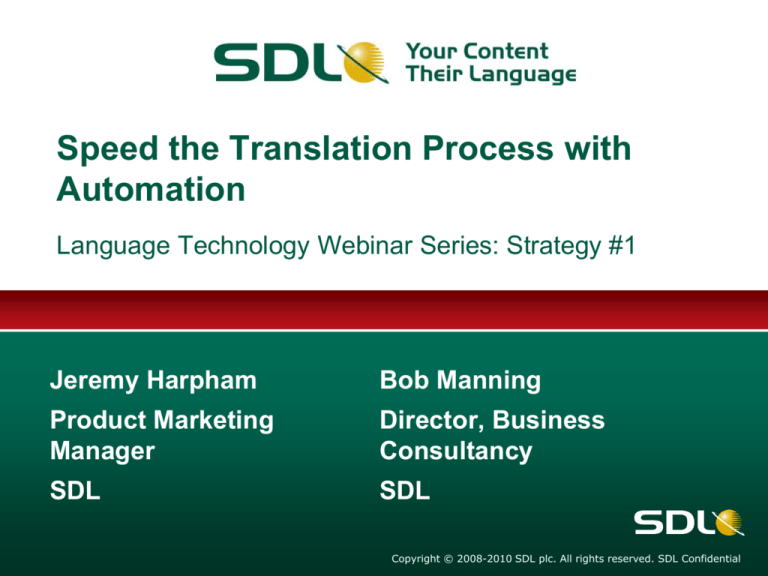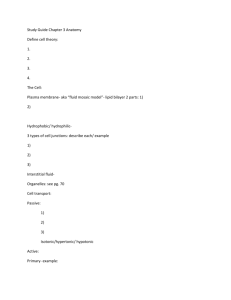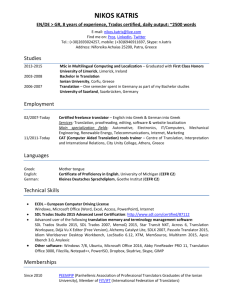
Speed the Translation Process with
Automation
Language Technology Webinar Series: Strategy #1
Jeremy Harpham
Bob Manning
Product Marketing
Manager
Director, Business
Consultancy
SDL
SDL
Copyright © 2008-2010 SDL plc. All rights reserved. SDL Confidential
Speakers
Jeremy Harpham
Jeremy Harpham
Product Marketing
Manager
Director, Business
Consultancy
SDL
SDL
What is a Translation
Management System?
Jeremy Harpham
Senior Product Marketing Manager
SDL
Copyright © 2008-2010 SDL plc. All rights reserved. SDL Confidential
It’s Worth Talking About!
50% reduction in time-to-market for
global launches
30% reduction in global content costs
Reduced management overhead by 85%
GIM costs reduced by 40%
Traditional Global Processes:
Excessive communication, inconsistencies & cost
Over 9,000
communications
required to source
content for catalogue
Different people
are chasing the
same content
Regional
marketing act as a
‘post-box’ and are
a bottle-neck
Translation happens
twice for the same
content
6 months
Product Catalogue Content Process
3 months
Regional
Marketing
BCU
Bruges
x17
x17
x17
Collate
x17
Trade
Sign-off
Localise
&
translate
NSO’s
NSO’s
x17
BCU
•
•
•
Mainstream
Hi-end
DTV + FTV
x17
Consumer
5 months
Singapore
Media
Ware
x17
x17
Web Content Process for Catalogue
Content takes
4 months to
reach the web
4 months
Create
Spain
BCU
Eindhoven
Content
Collate
Translate
DB
Sign-off
Localise
Sweden
Commission
AKBS
AKBS
MDB
P3C
4 months = new AKBS
Source: Philips presentation at SDL GIM conference, UK, November 2006
2 months = update AKBS
Only 18% of
TV product
leaflets get to
P3C
The Volumes Involved
ORIGINAL
V. 1
V. 2
V. 3
Shared
Content
Shared
Content
COMPLEXITY
THROUGHOUT MULTIPLE CHANNELS
1,000
Words
English
French
German
Print
Dutch
Japanese
Shared
Content
Shared
Content
Web
Online
V. 4
4000
Total
Words
Total
Words
Total
Words
20000
60000
3500
Translated
Translated
18000
50000
MultiChannel
3000
16000
14000
2500
40000
12000
2000
10000
30000
1500
8000
20000
1000
6000
500
4000
10000
2000
0
By March
By June
0
By March
March
By
ByJune
June
By
By September
By December
BySeptember
September
By
ByDecember
December
By
Translation Management Systems
• Centralize assets –
translation memories,
MT into one place and
drive up reuse
Centralize
• Across the supply
chain
• With existing
business systems
• Integrate with other
language technologies
for efficiencies
Collaborate
Automate
• Reduce the number
of manual tasks
• Repeatable and reliable
processes
Flexibility to deploy as you want to
Typical Pre-TMS Translation Workflow
Process Start
Pain:
Manual extraction of
translatable content
Content Manager
Determines what
content requires
translation
Content Manager
Sends translation
request (email or FTP)
Pain:
Lack of automation
(integration into
content stores)
Content Manager
Manually extracts
content from content
store
Content Manager
Manually extracts
content metadata for
localization
Pain:
Manual gathering of
content to localize
Pain:
Vendor file analysis
results in excess cost/
delays
Pain:
Unknown quality /
accuracy of TM
leverage,
Loc Manager
Reviews translation
request / manually
gathers content /
sends content
Vendor Loc Mgr
Performs word count
analysis and sends
quote
Loc Manager
Reviews quote
Pain:
Increased cost / time
due to additional file
analysis and retranslation
NO
Quote
Approved?
Vendor Loc Mgr
Adjusts / /resends to
Loc Manager (email/
FTP)
YES
NO
Pain:
Manual retrieving of
translation assets
Content Manager
Retrieves translation
assets
Content Manager
Sends assets/ref
assets to reviewers
(email or FTP)
Vendor Loc Mgr
Sends translation
assets to translator
(email/FTP)
Pain:
If changes made
directly to translation
assets, TM leverage /
reuse lost
In-country Reviewers
Emails Loc Manager
with approvals or
suggested changes
Content Manager
Receives/collects
translated assets
(email or FTP)
Translators
Collects content to
translate via email or
FTP
Pain:
No ability to
dynamically review incontext (on-line)
In-country Reviewers
Review translated
assets
Loc Manager
Updates / maintains
Translation Memories
(if used)
Pain:
Manual gathering of
content to review
In-country Reviewrs
Retrieves assets
(email or FTP)
Translators
Send translation
assets to Loc Project
Manager
YES
Pain:
Lack of automation
(integration into
content stores)
Content Manager
Manually inserts
translation assets into
content store
Process End
22 Manual Steps
Loc Manager
Retrieves translation
assets from reviewers
with status/notes
Translations
Approved
Pain:
Increased costs due to
vendor TM
management / lack of
insight into TM quality
Translators
Translates content
Legend
Company “A” manual steps aided /
automated with SDL TMS
Translation Vendor manual steps
reduced / eliminated with SDL TMS
Only manual steps expected in
translation process
Pain associated with translation
process step
Translators
Saves translation
assets in required
encoding
Pain:
No ability to
dynamically review incontext (on-line)
Translation Workflow with SDL TMS
Process End
Process Start
No manual
extractions of
content for
translation
Content is gathered
through content
store workflow
(CMS, etc) or change
detected by TMS
Translation projects
created via TMS APIs
or through TMS
monitoring for new/
changed content
Content Managers
are not required to
package up and
send assets for
translation
Automatic file
analysis, filtering,
TM leverage used to
calculate translation
cost
Loc Manager does
not need to retrieve
translation assets or
manually send to
translation vendors
Assets for
translation
automatically sent to
or retrieved by TMS
Translation project
automatically
created through
defined business
rules
Cost analysis
preformed against
translation vendor(s)
agreed upon cost
model(s)
Assets are
automatically filtered
and analyzed against
existing centralized
TM
Translation assets
sent to or retrieved
by content store
(CMS, etc.)
Email sent to
Content Manager
signifying translation
project completion
3 (or 4) Manual Steps
Loc Manager
Reviews translation
request through web
interface for
authorization
TMS provide
translation kit with
source assets, TM,
Terminology
Vendor Loc Mgr
Approves translation
request (optional)
Translators
Translates content
Vendor Loc Mgr no
longer has to do file
analysis – reduced
project management
costs
Translation assets
are generated in
same format as the
source assets
Centralized TM
updated upon final
approval
In-country Reviewers
Review translated
assets
Legend
Minimal required translation
process manual steps
Automated translation process
steps through SDL TMS
SDL TMS advantages or process
improvements
Automatic email notification
TMS provides a
translation web
interface or allows
exports to desktop
translation tools
Real time in-context
preview available
through TMS web
interface – reduction
of errors
Reviewers can
dynamically preview
translated assets
through web
interface
Reviewers need not
send assets back to
translation vendors
for minor updates –
can do themselves
Reviewers can
update translation
through web
translation tool –
updates TM
No asset retrieval or
sending necessary
No need for vendors
to manage TMs –
reduced project
management costs
SDL Business Case at Intel
Support.intel.com
Source: Intel presentation at SDL GIM conference, UK, March 2007
SDL Business Case at Salesforce.com
Source: Salesforce.com presentation at SDL GIM conference, UK, March 2007
Case Study: Hewlett Packard
Source: HP presentation at SDL conference
Sunnyvale Sept 2006
SDL Translation Management
Linguistic Technology
Centralized and scalable…
Translation Memory
• Advanced matching algorithms
• Enterprise scalability
• Support for TMX, XLIFF and other native
TKIT formats
Terminology Database
• Actively manage consistency of key
terminology
• Supports TBX standard
Machine Translation
• Integrate Automated Machine
Translation in your overall process
Linguistic Quality Review
• Track type and frequency of
translation issues
• Monitor trends
Content Integration
Centralized File Filtering
Consistent filtering of source files
Support DOC, XLS, PPT, XML, HTML
ASP, JSP, Content authoring formats,
others
Content Connectors
ECM: Documentum, Lotus Notes
WCM: SDL Tridion, Interwoven TeamSite
Structured Content: SDL Trisoft
DBMS: Oracle, SQL Server
Change Detection
Automate submission of translation
projects directly from content repository
Localization Metadata
Maintain translation-related metadata and
history
Process Automation
Process Automation
Sophisticated Workflow Engine (Automatic
Actions plus Human Actions)
Automated Notifications
Project Management
Easily track progress of all translation
efforts
Collaboration
Formalize review process
Enable communication between
translators and reviewers
Capture “last minute” updates and
corrections
Business Rules Engine
Intuitive, wizard-driven, rules builder – no
programming required
Typical Pre-TMS Translation Workflow
Process Start
Pain:
Manual extraction of
translatable content
Content Manager
Determines what
content requires
translation
Content Manager
Sends translation
request (email or FTP)
Pain:
Lack of automation
(integration into
content stores)
Content Manager
Manually extracts
content from content
store
Content Manager
Manually extracts
content metadata for
localization
Pain:
Manual gathering of
content to localize
Pain:
Vendor file analysis
results in excess cost/
delays
Pain:
Unknown quality /
accuracy of TM
leverage,
Loc Manager
Reviews translation
request / manually
gathers content /
sends content
Vendor Loc Mgr
Performs word count
analysis and sends
quote
Loc Manager
Reviews quote
Pain:
Increased cost / time
due to additional file
analysis and retranslation
NO
Quote
Approved?
Vendor Loc Mgr
Adjusts / /resends to
Loc Manager (email/
FTP)
YES
NO
Pain:
Manual retrieving of
translation assets
Content Manager
Retrieves translation
assets
Content Manager
Sends assets/ref
assets to reviewers
(email or FTP)
Vendor Loc Mgr
Sends translation
assets to translator
(email/FTP)
Pain:
If changes made
directly to translation
assets, TM leverage /
reuse lost
In-country Reviewers
Emails Loc Manager
with approvals or
suggested changes
Content Manager
Receives/collects
translated assets
(email or FTP)
Translators
Collects content to
translate via email or
FTP
Pain:
No ability to
dynamically review incontext (on-line)
In-country Reviewers
Review translated
assets
Loc Manager
Updates / maintains
Translation Memories
(if used)
Pain:
Manual gathering of
content to review
In-country Reviewrs
Retrieves assets
(email or FTP)
Translators
Send translation
assets to Loc Project
Manager
YES
Pain:
Lack of automation
(integration into
content stores)
Content Manager
Manually inserts
translation assets into
content store
Process End
22 Manual Steps
Loc Manager
Retrieves translation
assets from reviewers
with status/notes
Translations
Approved
Pain:
Increased costs due to
vendor TM
management / lack of
insight into TM quality
Translators
Translates content
Legend
Company “A” manual steps aided /
automated with SDL TMS
Translation Vendor manual steps
reduced / eliminated with SDL TMS
Only manual steps expected in
translation process
Pain associated with translation
process step
Translators
Saves translation
assets in required
encoding
Pain:
No ability to
dynamically review incontext (on-line)
Translation Workflow with SDL TMS
Process End
Process Start
No manual
extractions of
content for
translation
Content is gathered
through content
store workflow
(CMS, etc) or change
detected by TMS
Translation projects
created via TMS APIs
or through TMS
monitoring for new/
changed content
Content Managers
are not required to
package up and
send assets for
translation
Automatic file
analysis, filtering,
TM leverage used to
calculate translation
cost
Loc Manager does
not need to retrieve
translation assets or
manually send to
translation vendors
Assets for
translation
automatically sent to
or retrieved by TMS
Translation project
automatically
created through
defined business
rules
Cost analysis
preformed against
translation vendor(s)
agreed upon cost
model(s)
Assets are
automatically filtered
and analyzed against
existing centralized
TM
Translation assets
sent to or retrieved
by content store
(CMS, etc.)
Email sent to
Content Manager
signifying translation
project completion
3 (or 4) Manual Steps
Loc Manager
Reviews translation
request through web
interface for
authorization
TMS provide
translation kit with
source assets, TM,
Terminology
Vendor Loc Mgr
Approves translation
request (optional)
Translators
Translates content
Vendor Loc Mgr no
longer has to do file
analysis – reduced
project management
costs
Translation assets
are generated in
same format as the
source assets
Centralized TM
updated upon final
approval
In-country Reviewers
Review translated
assets
Legend
Minimal required translation
process manual steps
Automated translation process
steps through SDL TMS
SDL TMS advantages or process
improvements
Automatic email notification
TMS provides a
translation web
interface or allows
exports to desktop
translation tools
Real time in-context
preview available
through TMS web
interface – reduction
of errors
Reviewers can
dynamically preview
translated assets
through web
interface
Reviewers need not
send assets back to
translation vendors
for minor updates –
can do themselves
Reviewers can
update translation
through web
translation tool –
updates TM
No asset retrieval or
sending necessary
No need for vendors
to manage TMs –
reduced project
management costs
Business Management
Estimation and Tracking
Know your translation costs before asking
for quotes
Business Intelligence
Out-of-the-box and custom reporting on
any aspect of the translation & localization
process
Quote Management
Track the status of formal quote requests
Supply Chain Management
Effectively manage multiple vendors
Utilize internal and external resources
Centralized and Automated Process
Agency
French
German
Italian
Spanish
Agency
TM
Agency
French
German
Portuguese
Spanish
TM
Czech
Hungarian
Russian
TM
Head Office
Agency
German
Japanese
Chinese
Korean
Agency
R&D
TM
TM
Spanish LA
Brazilian
Portuguese
Agency
French
R&D
Content
Store
TM
Content
Store
French Office
German Office
Global
Information
Management
Sales &
Marketing
Content
Store
Agency
Sales &
Marketing
Sales &
Marketing
Support
Content
Store
Content
Store
Content
Store
TM
Translation Management Delivers…
Process Automation
Translation throughput is increased and time-to-market reduced by
automating manual processes.
Improved Quality and Consistency
Centralized translation memory (TM), terminology and dictionaries ensure
consistency and accuracy across enterprise.
Content Integration
Enables access and integration with enterprise content and data from
various sources, including content management systems
Reduced Total Cost
Re-use of prior translations, increased throughput, reduced manual costs
Management Visibility
Real-time reporting of translation performance metrics for continuous
process improvement.
Companies That Get This Right..
Enhance customer experience
Stimulate loyalty across markets by communicating the relevant information in the
language of your customer
Respond to individual preferences in local language
Retain customers and maintain market share
Ensure consistent branding
Maintain a consistent brand while respecting cultural nuance
Deliver a seamless global experience across all communications
Drive higher revenues through consistent branding
Control costs and accelerate time-to-market
Gain competitive advantage through rapid and flexible deployment of information
across target markets
Increase productivity and control costs
Beat competitors to market and grow market share
Questions?
To ask a question, use the Q&A panel in the
right hand corner of your screen.
Copyright © 2008-2010 SDL plc. All rights reserved. SDL Confidential
More Information….
SDL Translation Management Systems:
Product Information: www.sdl.com/en/products/translation-management/
Gilbane Research: 6 Ways to Convince Execs on the Value of Translation
Management: www.sdl.com/gim-justification
Case Studies: www.sdl.com/knowledgecenter
Language Technology Webinar Series: www.sdl.com/en/sites/lt-summer-webinars/
Thursday’s from 11:00-11:30am EDT
Strategy #2. Improve Translation Productivity by Sharing
Strategy #3. Making Automated & Crowd Translation Work for You
Strategy #4. Style & Global Branding Best Practices
Strategy #5. Adapt & Localize Software for Global Markets
Connect with Us: info-tech-usa@sdl.com
@sdltechnologies
Executive Forum: Strategies for
Managing Global Information





